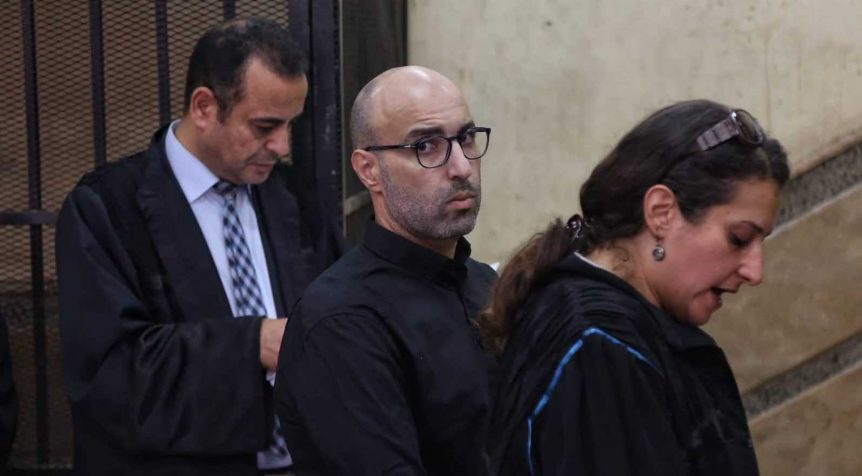CIHRS Egypt director Mohamed Zaree files request to public prosecutor to attend UPR
Mohamed Zaree, director of the Egypt Program at the Cairo Institute for Human Rights Studies (CIHRS) and banned from travel by the Egyptian government since 2016, filed a request on November 7th with the public prosecutor and the Cairo Appeals Court to travel, for one time, to Geneva to participate in the UN Universal Periodic Review (UPR) of Egypt’s human rights record this month. Zaree has yet to receive a response to his request.
“The UPR is an important instrument for improving the human rights situation in the country…. The state must permit independent rights defenders critical of Egypt’s human rights record to travel,” Zaree said. “That is, if the state wants to constructively engage with the UPR, rather than attending the session and going back to violating human rights as if nothing happened.”
Regrettably, Egypt under the helm of President Abdel Fattah al-Sisi has no record of engaging constructively in any international human rights mechanism. Quite the opposite, over the last five years the Egypt has engaged in intimidation and reprisals against independent human rights defenders who cooperate with UN instruments. Most recently, rights defender Mohamed al-Baqer was detained for submitting a report to the UPR on Egypt’s violations of the rights of Nubians.
Mohamed Zaree himself has faced reprisals from the Egyptian state for cooperating the UPR. A year after being banned from travel in May 2016 by Hisham Abdel Meguid, the judge in case no. 173 of 2011 (known as the Foreign Funding Case), Zaree was summoned for questioning on charges of receiving funds from foreign bodies with the purpose of spreading false news in order to threaten state security. The CIHRS report submitted for Egypt’s second UPR in 2014, to which Zaree contributed, was among the items cited by the judge as “evidence” of the charges. He was released on LE30,000 bail. Most recently, Zaree’s personal assets were frozen by the tax authority a few months ago. Although he filed an appeal of the measure, no hearing has yet been scheduled to consider it.
In July 2019, Mohamed Zaree and other human rights defenders filed a challenge to the travel ban orders before the South Cairo Criminal Court, 15th circuit of the same court that acquitted 43 staff members of American and German organizations in the first part of case no. 173 of 2011 on foreign funding. Although the same circuit quickly issued a judgment in the first part of the case (dealing with foreign or international organizations) and acquitted the defendants after two hearings in over just three months, it has yet to take meaningful action in the second part of the case (dealing with Egyptian organizations), with the court repeatedly adjourning the appeal of the travel bans against Egyptian rights defenders for lengthy periods between every hearing. For foreigners such cases are quickly adjudicated, but for Egyptians citizens the process is protracted interminably, with no end in sight. The next hearing is scheduled for 17 November.
The travel bans and asset freezes are part of a wider, unprecedented offensive against independent human rights groups by the Egyptian state under President Abdel Fattah al-Sisi. Some organizations have shut down, either by state decree or because of asset freezes. This crackdown, however, “will not silence” human rights defenders, Zaree said:
“No matter what the state does to impede the work of defenders—even if it shuts down all human rights organizations in the country—its human rights abuses speak for themselves and cannot be hidden. If the state is concerned about its international image, it should respect human rights rather than repressing those who expose abuses.”
Share this Post

